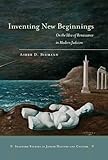Inventing new beginnings : on the idea of Renaissance in modern Judaism / Asher D. Biemann.
Material type: TextSeries: Stanford studies in Jewish history and culturePublication details: Stanford, Calif. : Stanford University Press, ©2009.Description: 1 online resource (x, 428 pages)Content type:
TextSeries: Stanford studies in Jewish history and culturePublication details: Stanford, Calif. : Stanford University Press, ©2009.Description: 1 online resource (x, 428 pages)Content type: - 9780804770453
- 080477045X
- Jews -- Germany -- History -- 1800-1933 -- Historiography
- Jews -- Germany -- History -- 1933-1945 -- Historiography
- Jews -- Germany -- Intellectual life -- 19th century
- Jews -- Germany -- Intellectual life -- 20th century
- Jews -- Cultural assimilation -- Germany
- Juifs -- Allemagne -- Histoire -- 1800-1933 -- Historiographie
- Juifs -- Allemagne -- Histoire -- 1933-1945 -- Historiographie
- Juifs -- Allemagne -- Vie intellectuelle -- 19e siècle
- Juifs -- Allemagne -- Vie intellectuelle -- 20e siècle
- Juifs -- Acculturation -- Allemagne
- SOCIAL SCIENCE -- Anthropology -- Cultural
- SOCIAL SCIENCE -- Discrimination & Race Relations
- SOCIAL SCIENCE -- Minority Studies
- Jews -- Cultural assimilation
- Jews -- Historiography
- Jews -- Intellectual life
- Germany
- Geistesleben
- Deutschland
- Juden
- 1800-1999
- 305.892/4043 22
- DS134.25 .B54 2009eb
- online - EBSCO
- digitized 2010 HathiTrust Digital Library committed to preserve
| Item type | Current library | Call number | URL | Status | Notes | Barcode | |
|---|---|---|---|---|---|---|---|
 eBook
eBook
|
Biblioteca "Angelicum" Pont. Univ. S.Tommaso d'Aquino Nuvola online | online - EBSCO (Browse shelf(Opens below)) | Online access | Not for loan (Accesso limitato) | Accesso per gli utenti autorizzati / Access for authorized users | (ebsco)297627 |
Includes bibliographical references and index.
Thinking in Renaissance or a grammar of beginnings. Beginnings: thresholds of continuity ; Beginning anew: the palingenesis of memory ; Turning: transformations into the open -- Writing in resurrection or the semantics of restoration. The imperishability of being: writing Jewish history in resurrection ; The retrieval of ambivalence: Jewish Renaissance and the (re- )turn( -ing) to/of tradition ; The unfinishedness of return: renaissance and the reaestheticization of Judaism.
Print version record.
Use copy Restrictions unspecified star MiAaHDL
Electronic reproduction. [Place of publication not identified] : HathiTrust Digital Library, 2010. MiAaHDL
Master and use copy. Digital master created according to Benchmark for Faithful Digital Reproductions of Monographs and Serials, Version 1. Digital Library Federation, December 2002. MiAaHDL
http://purl.oclc.org/DLF/benchrepro0212
digitized 2010 HathiTrust Digital Library committed to preserve pda MiAaHDL
"Inventing New Beginnings is the first book-length study to examine the conceptual underpinnings of the "Jewish Renaissance, ' or "return" to Judaism, that captured much of German-speaking Jewry between 1890 and 1938. The book addresses two very fundamental, yet hitherto strangely understated, questions: What did the term "renaissance" actually mean to the intellectuals and ideologues of the Jewish Renaissance, and how did this understanding relate to wider currents in European intellectual and cultural history of the nineteenth and early twentieth centuries? The study also addresses the larger question of how we can contemplate "renaissance" as a mode of thought that is conditioned by the consciousness and experience of modernity and that extends still to our present time."--Jacket.


